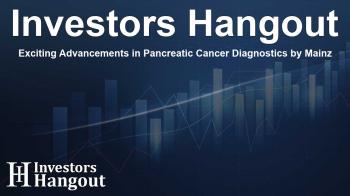Exciting Advancements in Pancreatic Cancer Diagnostics by Mainz

Mainz Biomed Launches a Feasibility Study for Pancreatic Cancer
In a significant stride towards improving cancer detection, Mainz Biomed N.V. (NASDAQ: MYNZ), a key player in molecular genetics diagnostics, has unveiled the initiation of a feasibility study for its PancAlert project. This innovative research initiative is designed to create a non-invasive blood test that focuses on the early detection of pancreatic cancer. The recent discovery analysis, conducted in collaboration with Liquid Biosciences, showcased impressive sensitivity of 95% and specificity of 98% when detecting pancreatic cancer from blood samples.
Collaborative Efforts with Crown Bioscience
Building upon its earlier achievements, Mainz Biomed has identified a promising panel of candidate mRNA biomarkers that may hold substantial clinical relevance. To ensure the reliability of these biomarkers, the company will collaborate with Crown Bioscience, a well-regarded contract research organization (CRO) renowned for its expertise in drug discovery support. Crown Bioscience excels in providing both preclinical and clinical research services that are pivotal for the development of biomarkers, enhancing personalized medicine approaches.
Testing the Next Generation of Biomarkers
The feasibility phase will involve rigorous testing of the selected biomarkers along with an accompanying machine learning-based algorithm using clinical blood samples. This process is crucial as it aims to assess the robustness, reproducibility, and overall diagnostic performance of the test in controlled laboratory settings. Evaluating the assay’s sensitivity, specificity, and consistency will be the focal point of this phase, along with how effectively the algorithm can stratify samples based on their risk factors. The insights garnered will be instrumental in determining the panel's and the algorithm's readiness for further development.
Commitment to Early Cancer Detection
Guido Baechler, the CEO of Mainz Biomed, expressed enthusiasm about this pivotal step in the PancAlert initiative, emphasizing the critical need for early detection of pancreatic cancer in the oncology landscape. He stated, "Early detection of pancreatic cancer remains one of the greatest unmet needs in oncology, and we are committed to delivering a solution that can significantly improve patient outcomes." This commitment underscores the company's mission to optimize the testing process and enhance patient care.
Future Plans Following Feasibility Outcomes
Should the outcomes of the feasibility phase prove positive, Mainz Biomed plans to advance to a validation study involving a larger cohort of blood samples. This step would be vital for refining the test's clinical applicability and setting the stage for regulatory submissions, including potential interactions with the U.S. Food and Drug Administration (FDA). This pancreatic cancer project reflects Mainz Biomed's broader goal of making molecular diagnostics accessible for early cancer detection, especially in scenarios where current screening methods fall short or are altogether absent.
About Mainz Biomed and Its Innovations
Mainz Biomed is dedicated to developing market-ready molecular genetic diagnostic solutions that address life-threatening conditions. The company's flagship product, ColoAlert, is a pioneering early-detection diagnostic test for colorectal cancer, known for its accuracy and ease of use. It is currently marketed across Europe and in the UAE, while Mainz Biomed actively engages in a pivotal FDA clinical study to gain approval within the U.S. market. Additionally, the company is advancing its product candidate portfolio with PancAlert, which serves as an early-stage screening test for pancreatic cancer utilizing real-time Polymerase Chain Reaction-based (PCR) multiplex detection methodologies.
Frequently Asked Questions
What is the purpose of the PancAlert project by Mainz Biomed?
The PancAlert project aims to develop a non-invasive blood test for the early detection of pancreatic cancer, enhancing patient outcomes through early intervention.
How does Mainz Biomed verify its panel of mRNA biomarkers?
Mainz Biomed collaborates with Crown Bioscience for the verification process, focusing on the reliability and effectiveness of the identified biomarkers in clinical settings.
What are the expected outcomes from the feasibility study?
The feasibility study aims to assess the diagnostic performance of the biomarkers and the accompanying algorithm, determining their robustness and consistency in identifying risk factors.
What is the significance of the CEO’s statement on early cancer detection?
The CEO emphasizes the urgency of addressing the unmet need for early detection in pancreatic cancer, highlighting the commitment of Mainz Biomed to develop effective diagnostic solutions.
What is the future plan for Mainz Biomed if the feasibility is successful?
If the feasibility phase yields positive results, Mainz Biomed intends to conduct a validation study with a larger sample size, paving the way for potential regulatory approval and clinical application.
About The Author
Contact Caleb Price privately here. Or send an email with ATTN: Caleb Price as the subject to contact@investorshangout.com.
About Investors Hangout
Investors Hangout is a leading online stock forum for financial discussion and learning, offering a wide range of free tools and resources. It draws in traders of all levels, who exchange market knowledge, investigate trading tactics, and keep an eye on industry developments in real time. Featuring financial articles, stock message boards, quotes, charts, company profiles, and live news updates. Through cooperative learning and a wealth of informational resources, it helps users from novices creating their first portfolios to experts honing their techniques. Join Investors Hangout today: https://investorshangout.com/
The content of this article is based on factual, publicly available information and does not represent legal, financial, or investment advice. Investors Hangout does not offer financial advice, and the author is not a licensed financial advisor. Consult a qualified advisor before making any financial or investment decisions based on this article. This article should not be considered advice to purchase, sell, or hold any securities or other investments. If any of the material provided here is inaccurate, please contact us for corrections.

